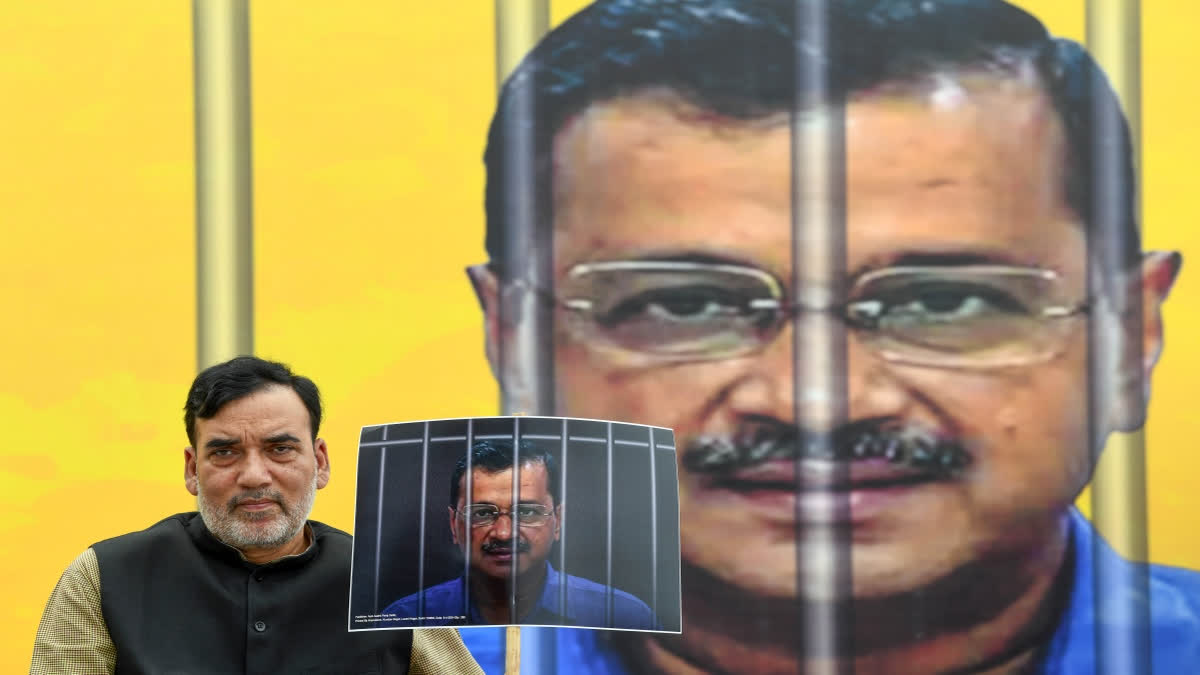New Delhi: The Supreme Court on Tuesday questioned the Enforcement Directorate (ED) on how Rs 100 crore proceeds of crime became Rs 1,100 crore in two to three years in the Delhi excise policy case and why the central agency took so much time in interrogation and why not direct questions or relevant questions were put in the initial stage.
Additional solicitor general (ASG) SV Raju, representing the ED, submitted before a bench comprising justices Sanjiv Khanna and Dipankar Datta that the digital evidence was destroyed. The ED, in its affidavit in the apex court countering Chief Minister Arvind Kejriwal's plea against his arrest in the Delhi excise policy case, had claimed that a total of over 170 mobile phones were changed/destroyed by 36 persons” and “crucial digital evidence” and “money trail has been actively destroyed."
'100 crore transferred through hawala'
Raju argued that cash transactions for 100 crores were transferred by hawala routes and spent in other states and claimed Rs 1,100 were proceeds of crime. Justice Khanna asked, “Rs 100 crore was proceeds of crime… how did it become Rs 1,100 crore in two or three years…that will be a phenomenal rate of return! How did it become Rs 1,100 crore?” Raju replied that Rs 590 crore was "wholesaler profit". Justice Khanna said the entire profit is not proceeds of crime and the difference is about Rs 338 crore.
Raju said when the investigation began it was not focused on Delhi CM Kejriwal, and initially not a single question was put regarding him, but as the investigations progressed his role emerged.
Why delayed probe against Kejriwal: SC asks ED
The bench observed that the interrogation has taken two years in the Delhi excise policy case and it is not good for any investigating agency to say that it takes two years to unearth. Raju argued that it had been found that Kejriwal stayed in a seven-star hotel in Goa during the Goa elections and added that part of his expenses was paid by a person who accepted cash. Raju stressed that it is not a politically motivated case.
Justice Khanna asked Raju that we take it that no question was asked about him but the only issue is why did not ask and why you were delaying the interrogation. “Why did it take so much time in interrogation and why not direct or relevant questions were put…”, said Justice Khanna. Raju said it takes time to understand the case and the investigating officers wanted to know what type of conspiracy was hatched by the accused, as it was a policy matter.
The hearing is in progress now. The Supreme Court is considering whether to grant interim bail to Delhi Chief Minister Arvind Kejriwal, who has been under arrest since March 21 and is currently confined in Tihar jail under judicial custody. Kejriwal was arrested in connection with a money laundering case linked to the scrapped Delhi excise policy.
ASG defends Kejriwal's arrest
Raju, defending Kejriwal’s arrest, argued that you must have material and from the material you may have reasons to believe to proceed with arrest. Justice Datta queried Raju on balancing the material against the accused. “If there is material, which points towards (the accused) not guilty…you selectively (exclude material, which does not point towards the accused)...it is an executive act, by an arrest you are taking away Article 21. Therefore, is it not necessary for you to reflect on those materials in your possession that are not pointing towards guilt?….you have to balance both. You cannot simply exclude one part of the material and say I have this material in my possession….”. Justice Datta asked Raju, adding why are you arguing that you have the material in your possession?
Justice Khanna told Raju that ED has filed a closure report and there is an evaluation done by the investigating officer and the Section 19 (of PMLA) benchmark is high compared and higher than in other criminal cases, even in the Customs Act. “The benchmark over here is higher, but you can argue that I will meet that benchmark”, said Justice Khanna.
Raju said I have considered all material, but whatever I have considered need not reflect in the reasons to believe and my reasons to believe have to be restricted only to that aspect from which I draw the inference of guilt.
Read more: ‘Won’t Permit Activity In Breach Of EIA Notification’, SC Halts Land Clearing For Assam Airport



